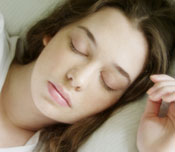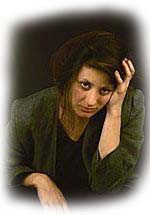 About 50% of postmenopausal women experience sleep disturbances such as insomnia.
About 50% of postmenopausal women experience sleep disturbances such as insomnia.
Researchers at Tehran University of Medical Sciences, in Iran, evaluated the effects of valerian extract taken nightly. Continue reading Effect of valerian on sleep quality →
 Researchers at Shahid Beheshti University of Medical Sciences, in Tehran, Iran, evaluated valerian — an herb with sedative effects and antispasmodic effects on smooth muscles — on the severity of dysmenorrhea. Continue reading Valerian for dysmenorrhea →
Researchers at Shahid Beheshti University of Medical Sciences, in Tehran, Iran, evaluated valerian — an herb with sedative effects and antispasmodic effects on smooth muscles — on the severity of dysmenorrhea. Continue reading Valerian for dysmenorrhea →
 Evidence for CAM to treat depression, anxiety, sleep disorders, and attention-deficit/hyperactivity disorder (ADHD) has been reviewed by researchers at Louisiana State University Health Sciences Center, in Kenner.
Evidence for CAM to treat depression, anxiety, sleep disorders, and attention-deficit/hyperactivity disorder (ADHD) has been reviewed by researchers at Louisiana State University Health Sciences Center, in Kenner.
Here’s what we know. Continue reading Review of CAM for behavioral health →
 Dr. Darrell Hulisz from Case Western Reserve University School of Medicine in Cleveland, Ohio reviews popular herbals.
Dr. Darrell Hulisz from Case Western Reserve University School of Medicine in Cleveland, Ohio reviews popular herbals.
Let’s focus on safety issues. Continue reading Safety review of popular herbal products →
 Â Here’s a report from Spain of a patient who self-medicated with valerian (Valeriana officinalis L) and passionflower (Passiflora incarnata L) while taking lorazepam (Ativan, a benzodiazepine drug). Continue reading Report of a valerian-lorazepam drug interaction →
 Here’s a report from Spain of a patient who self-medicated with valerian (Valeriana officinalis L) and passionflower (Passiflora incarnata L) while taking lorazepam (Ativan, a benzodiazepine drug). Continue reading Report of a valerian-lorazepam drug interaction →
 Dr. Darrell Hulisz from Case Western Reserve University School of Medicine in Cleveland, Ohio has written a continuing education article on herbals.
Dr. Darrell Hulisz from Case Western Reserve University School of Medicine in Cleveland, Ohio has written a continuing education article on herbals.
Here are the author’s take-away points, with additional references added. Continue reading Key points about commonly used herbals →
 The relationship between supplements and lead levels in blood has been an ongoing project for researchers in Boston.
The relationship between supplements and lead levels in blood has been an ongoing project for researchers in Boston.
In this study, researchers from Beth Israel Deaconess Medical Center report specific herbal supplements are associated with higher blood lead levels among women. Continue reading Herbals and lead levels in Americans →
 Researchers from the Mayo Clinic in Rochester, Minnesota have reviewed the evidence and report that most interactions are confined to a relatively small number of drug classes and supplements. Continue reading Drug-supplement interactions in perspective →
Researchers from the Mayo Clinic in Rochester, Minnesota have reviewed the evidence and report that most interactions are confined to a relatively small number of drug classes and supplements. Continue reading Drug-supplement interactions in perspective →
 OK, you’re scheduled for surgery, and you take herbals.
OK, you’re scheduled for surgery, and you take herbals.
Does your surgeon know what you take?
Be smart. If you use any of the herbals on this list, tell your surgeon.
Continue reading What not to take before surgery →
 A company called Fashion Sanctuary is removing from the market all Zhen De Shou Fat Loss Capsules sold in 10-count blister cards.
A company called Fashion Sanctuary is removing from the market all Zhen De Shou Fat Loss Capsules sold in 10-count blister cards.
In addition, Balanced Health Products, Inc. is voluntarily recalling Starcaps Diet System Dietary Supplement sold in 30-capsule plastic bottles. Continue reading FDA warning on 2 weight loss products →
 Researchers from the University of Sydney in Australia have reviewed the evidence in children and adolescents.
Researchers from the University of Sydney in Australia have reviewed the evidence in children and adolescents.
The authors include data from adults, because if they limited the discussion to children and adolescents it would be a very short article.
That’s not a problem here. Continue reading CAM for psychiatric disorders in kids →
 A review published in American Family Physician covers a broad range of herbal and dietary supplements for treating anxiety disorders.
A review published in American Family Physician covers a broad range of herbal and dietary supplements for treating anxiety disorders.
I’ll focus on the best of the lot, kava (Piper methysticum). You can read the rest of the article here. Continue reading Compiling the evidence for kava to treat anxiety →
 Drs. Kalyanakrishnan Ramakrishnan and Dewey Scheid from the University of Oklahoma Health Sciences Center have published a review of treatment options for sleeplessness.
Drs. Kalyanakrishnan Ramakrishnan and Dewey Scheid from the University of Oklahoma Health Sciences Center have published a review of treatment options for sleeplessness.
Melatonin, valerian, and several non-drug treatments are compared to benzodiazepines and non-benzodiazepine options. Continue reading Comparing treatments for insomnia →
 Here’s a review by researchers at the University of Illinois, Chicago that focuses on the scientific support for the use of herbals in women during menopause. It differs a bit in its conclusions from a more general review posted here recently.
Here’s a review by researchers at the University of Illinois, Chicago that focuses on the scientific support for the use of herbals in women during menopause. It differs a bit in its conclusions from a more general review posted here recently.
Both reviews list St. John’s wort as the most useful herbal for alleviating mood and anxiety changes during menopause. Continue reading Herbal options to treat mood and anxiety in menopausal women →
 Dr. Philip Hansten from the University of Washington School of Pharmacy has spent more than 30 years chronicling and documenting drug interactions.
Dr. Philip Hansten from the University of Washington School of Pharmacy has spent more than 30 years chronicling and documenting drug interactions.
In an article in Pharmacy Times, he and Dr. John Horn focus on the risks for people with diabetes or taking blood thinners. Continue reading Getting specific about CAM-drug interactions →
 Patients with the highest risk for sleep disturbance are those with pain, mental illness, limited activity, and overall “poor physical and mental health.” Continue reading What to do about the high prevalence of insomnia →
Patients with the highest risk for sleep disturbance are those with pain, mental illness, limited activity, and overall “poor physical and mental health.” Continue reading What to do about the high prevalence of insomnia →
Complementary and Alternative Medicine: Fair, Balanced, and to the Point
 About 50% of postmenopausal women experience sleep disturbances such as insomnia.
About 50% of postmenopausal women experience sleep disturbances such as insomnia.

 Dr. Darrell Hulisz from Case Western Reserve University School of Medicine in Cleveland, Ohio
Dr. Darrell Hulisz from Case Western Reserve University School of Medicine in Cleveland, Ohio  Â Here’s a
 Here’s a  The relationship between supplements and lead levels in blood has been an ongoing project for researchers in Boston.
The relationship between supplements and lead levels in blood has been an ongoing project for researchers in Boston. OK, you’re scheduled for surgery, and you take herbals.
OK, you’re scheduled for surgery, and you take herbals. A company called Fashion Sanctuary is removing from the market all Zhen De Shou Fat Loss
A company called Fashion Sanctuary is removing from the market all Zhen De Shou Fat Loss  Researchers from the University of Sydney in Australia have
Researchers from the University of Sydney in Australia have  A review published in American Family Physician covers a broad range of herbal and dietary supplements for treating anxiety disorders.
A review published in American Family Physician covers a broad range of herbal and dietary supplements for treating anxiety disorders. Here’s a
Here’s a